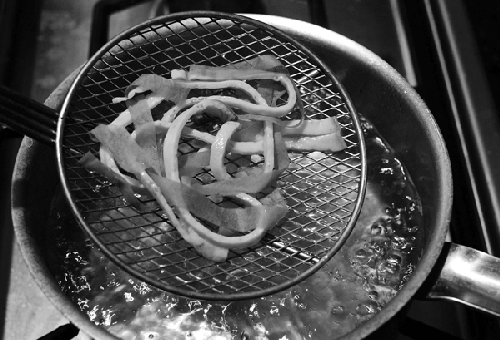It’s cool to see
bacon-wrapped scallops where the bacon just sticks to the scallop. It’s also a good
example of how to work with transglutaminase.
In a small bowl, mix roughly 2 parts water to 1 part transglutaminase to create a
slurry.
On a small plate that will fit in your fridge, lay out:
8 scallops as large and as cylindrical as possible,
patted dry
8 slices bacon, cut in half so that they can wrap around
a scallop one time
Using a brush, coat one side of each piece of bacon with the slurry. Place a scallop
on the bacon and roll the bacon around the scallop. Repeat for each scallop and transfer
to the fridge for at least two hours to allow the transglutaminase to set.
After resting, the bacon should be well adhered to the scallops.
Preheat your oven to 400°F / 200°C.
Place the scallops in a hot frying pan lightly coated with oil or a small amount of
butter, with one of the “exposed” ends down. This will cause a Maillard reaction and
develop a nice layer of flavor on the scallops. After a minute or so, flip the scallops
over so that the other exposed side is in contact with the pan and immediately transfer
your frying pan to the oven.
Finish in the oven for about five to eight minutes, until the bacon is done and the
scallops are cooked.
Note
Use only an oven-safe frying pan in your oven. Some commercial frying
pans have silicone handles—typically blue—that are oven-safe.
Use a brush to coat one side of a strip of bacon with
transglutaminase. (If you don’t already have a pastry brush, consider getting
one made with plastic bristles, because that type will not leave strands
behind.)
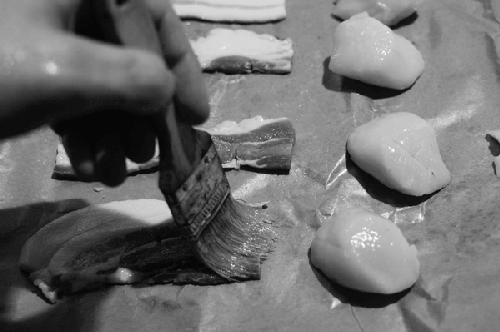
Carefully roll the bacon around the scallop. The transglutaminase
will not bond instantly, so you will need to pinch and press the items
together. Let set for two hours in the fridge.
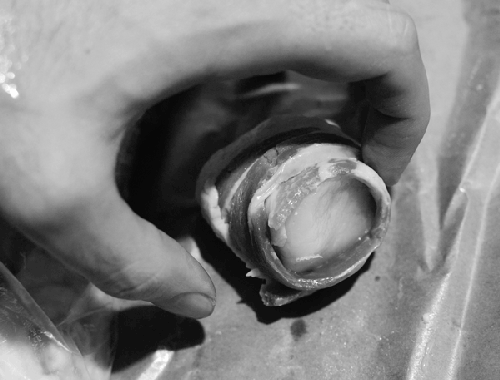
Pan sear the scallops on high heat, flip to sear on both sides,
and transfer to the oven to finish.
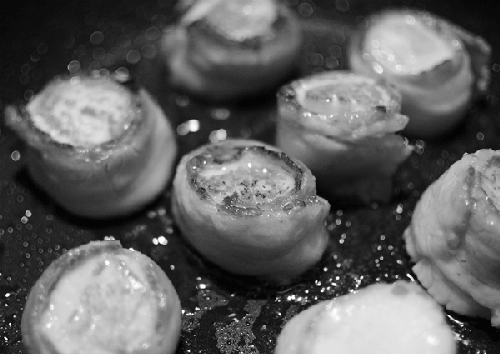
A cross-sectional slice of the finished product shows the joined
surface of the bacon and the scallop. (Shown on top of a leaf of bok
choy.)
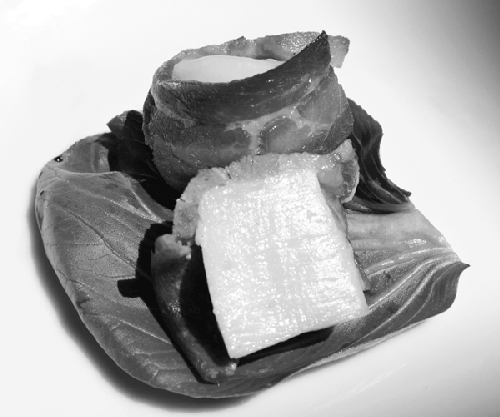
Since transglutaminase binds proteins at the
molecular level, you can also use it as a binder to form ground meats into a solid
form . Imagine taking wood glue and, instead of gluing two boards together,
using the glue to re-form a piece of wood from sawdust. Yes, just like particleboard
or chipboard. The next recipe demonstrates this concept.
Purée with an immersion blender or food processor:
175g shrimp, raw, peeled, and deveined
50g water
10g transglutaminase
Transfer the purée to the center of a large sheet of parchment paper. Using a
spatula, fan out the purée so that it’s flat enough to place a second piece of parchment
paper on top of it. Using a rolling pin, roll the purée out to a thickness of 1/8″ / 0.3
cm, just as you would for a pie crust dough. Transfer the “sandwiched” purée to the
fridge and let rest for a minimum two hours, preferably overnight.
In a large pot, bring salted water to a rolling boil.
Fill a large bowl with ice water.
Using a sharp chef’s knife, cut a portion of the sandwiched purée down to a size
that will fit in your pot. Carefully slip the sheet into the boiling water. The
parchment paper should detach from the shrimp purée; this is expected. After 30 seconds
to a minute, use a spider (or slotted spoon and tongs, if you’re careful) to fish out
the shrimp sheet from the boiling water, and transfer it to the ice water bath to stop
the cooking process.
You should now have a “sheet” of shrimp that you can slice into noodles or use as a
wrap around food items. To make shrimp noodles, slice the shrimp sheet into thin slices,
which can then be floated in seafood broth or tossed with seared tofu, sesame seeds,
sautéed green onions, and soy sauce. Or, try making “reverse sushi,” using the shrimp
sheet as the wrapper for the rice in place of the customary nori seaweed wrapper.
You can use rubber bands on the edges of your rolling pin to achieve a
consistent thickness. This photo shows the shrimp and transglutaminase purée
sandwiched in parchment paper.
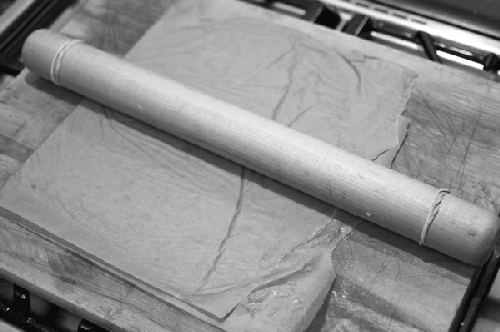
A spider is a handy tool for fetching delicate items from boiling
water. Note that the shrimp noodles and parchment paper have separated in the
boiling water.
